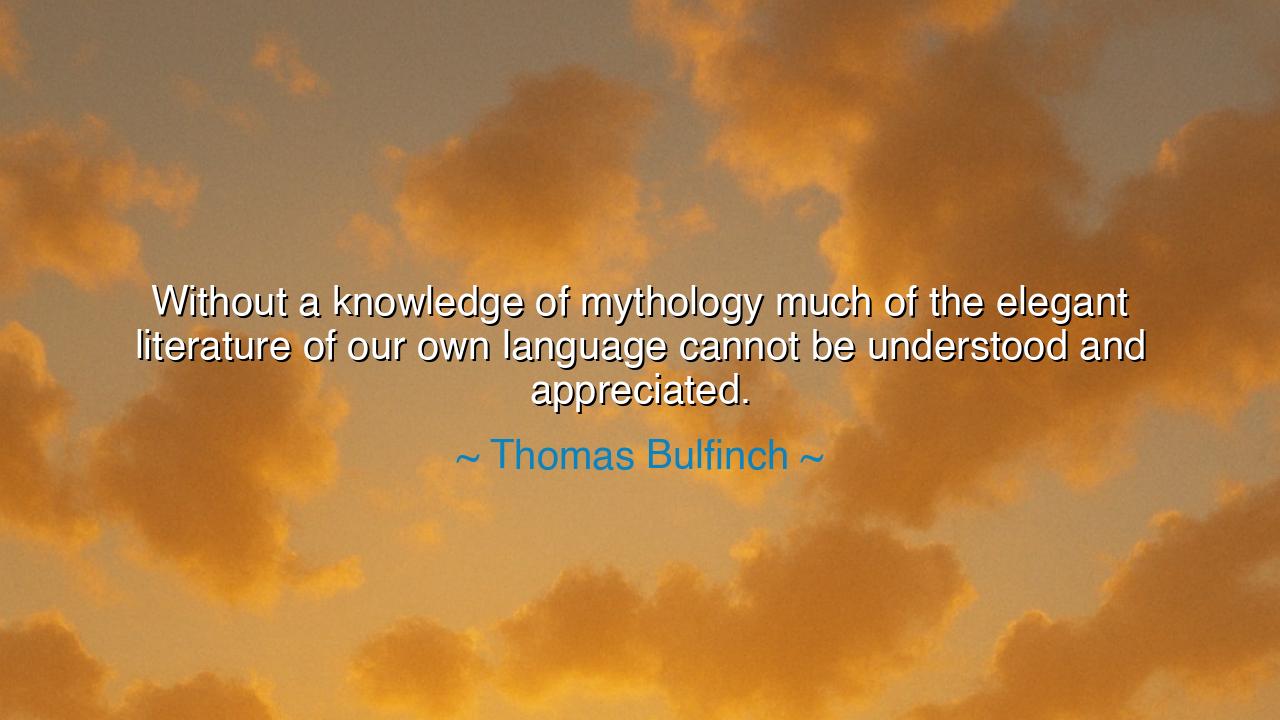
Without a knowledge of mythology much of the elegant literature
Without a knowledge of mythology much of the elegant literature of our own language cannot be understood and appreciated.






The words of Thomas Bulfinch—“Without a knowledge of mythology much of the elegant literature of our own language cannot be understood and appreciated.”—are like the voice of a sage reminding us that the stories of the past are the lifeblood of the present. Bulfinch, who in the nineteenth century gathered and retold the great myths of Greece, Rome, and beyond, knew well that these ancient tales were not idle fancies, but the foundation stones upon which modern literature was built. To know mythology is to hold the key to countless doors of meaning, unlocking the hidden treasures woven into poems, plays, and novels across the ages.
When he speaks of mythology, he does not mean only the tales of gods and monsters, but the symbolic language by which human beings have always explained their world. Zeus hurling his thunderbolt, Prometheus stealing fire, Orpheus descending to the underworld—these are not merely stories but mirrors of human struggle, ambition, love, and despair. Writers have drawn upon these figures to embody truths too deep for plain speech. Without knowledge of them, the modern reader stares at the surface of a work, never perceiving the depths that lie beneath.
Consider the words of Shakespeare, whose plays are filled with echoes of the old myths. To understand Puck’s mischief in A Midsummer Night’s Dream, or to grasp the tragic nobility of Hamlet, steeped in references to Hercules and Hyperion, is to see that the Bard did not write in isolation. He drank deeply from the well of ancient lore. Without such knowledge, his lines lose their richness; with it, they blaze with color and resonance. Bulfinch understood that to appreciate literature is to see both the text and the vast tradition behind it.
History gives us another example: Dante’s Divine Comedy. Without the mythology of Virgil, Ovid, and the ancients, Dante’s journey through Hell, Purgatory, and Paradise cannot be fully grasped. His Inferno is peopled with figures from classical myths as much as from Christian scripture. To the reader who knows both traditions, the poem becomes a grand tapestry of East and West, pagan and Christian, human and divine. But to one ignorant of these myths, the beauty and brilliance are veiled. Here we see the truth of Bulfinch’s claim: ignorance of mythology blinds us to the full glory of art.
Yet mythology is more than an academic tool; it is a bridge between past and present. The elegant literature of our language is not only decorated with myth, but animated by it. Writers from Milton to Keats, from Joyce to Eliot, all used myth as the clay with which to sculpt new visions of human experience. Even in our modern world, filmmakers and storytellers still return to the same archetypes—heroes’ journeys, tragic flaws, godlike powers—for these are the eternal patterns of the human soul. Without knowledge of mythology, we are cut off from this great conversation that stretches across centuries.
The lesson, then, is that we must not neglect the study of these ancient stories. To dismiss them as irrelevant is to deny ourselves access to the wellspring of meaning that nourishes so much of what we read and watch. Knowledge of mythology is not about worshiping forgotten gods, but about understanding the language of symbol, metaphor, and archetype through which humans have always spoken. It is about sharpening our vision so that we may perceive what lies hidden beneath the text, hearing the echoes of the ancients in the voices of the moderns.
Therefore, O seeker of wisdom, take up this charge: read the myths, not only for their wonder but for the keys they grant. Let Homer, Ovid, and Bulfinch himself be your guides. When you next read poetry, when you hear a reference in speech, or when you watch a story unfold on screen, recall the old tales that underlie them, and you will see with new eyes. For as Bulfinch declared, without mythology, we cannot fully understand or appreciate the gifts of literature. But with it, we join the eternal chain of human imagination, and our hearts and minds are enriched beyond measure.






AAdministratorAdministrator
Welcome, honored guests. Please leave a comment, we will respond soon